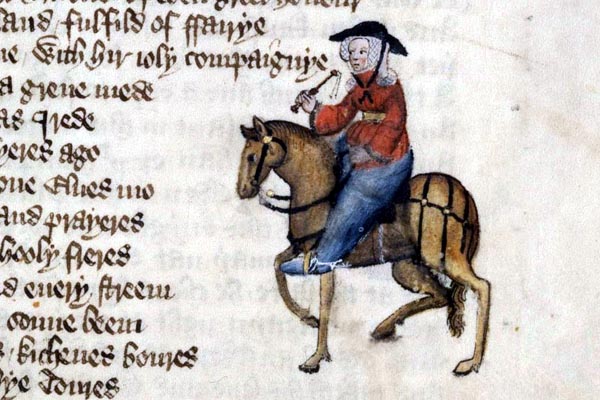 |
| The Wife of Bath in an old manuscript (Wikipedia) |
Note: The Canterbury Tales are one of the greatest collections of stories in English--and an early one, at that, predating Shakespeare by roughly two centuries!
Get Ready: Have you seen the movie Shrek? Do you remember the plot twist at the end?
Geoffrey Chaucer's Canterbury Tales were written in Middle English over 600 years ago, making them difficult to read today. And that's a shame, because the book is full of cracking good yarns. In one story, you might recognize the basis of the movie Shrek.
"The Wife of Bath's Tale" is about the days of King Arthur, which even in Chaucer's time were far in the past, and a time when people believed the land was full of fairies.
A girl came to Camelot to seek justice because one of Arthur's knights (who remains unnamed) had attacked her while she was bathing in a river. Queen Guinevere intervenes to save the knight's life and announces that, in lieu of execution, the knight is to ride forth and learn within a year, on pain of death, the answer to the question: "What it is that women most desire?"
Throughout his year-long quest, he receives many answers from all sorts of women--they desire riches, or clothes, or happiness, or love. But near the end of the year, no two answers agree. He turns his horse toward home, accepting his fate.
But nearing Camelot, he comes across a group of dancing maidens. As he runs toward them to seek an answer, they vanish! In their place is a hideously ugly old woman. She offers to help him, and he asks her his question.
Before answering, she makes him swear to do whatever she asks. Imagining the executioner's sword on his neck, he kneels down and agrees. With that, she leans toward him and mumbles in his ear...
That night, he rides into Camelot with the old crone on his saddle. When Queen Guinevere demands his answer, he says: "What women want is the freedom to do as they please!" All recognize the truth of the answer, and his life is spared.
With that, the old woman asks him to marry her. Reluctantly, he keeps his promise, and they are wed.
That night, sensing his distress, she makes him an offer: She can remain as she is, with the knight assured that she will remain true to him; or she can become young, and beautiful--and he will always have to worry that she might cheat on him.
Amazed, he decides to let her choose the best course, and he will follow her wishes--at which she transforms into a woman of great beauty! His gift of liberty has set her free from a spell, and they live happily in trust and freedom.
--------- Read more: https://en.wikipedia.org/wiki/The_Wife_of_Bath%27s_Tale
- Read "The Wife of Bath's Tale" in a modern retelling FREE online (you can skip the Prologue and go straight to the Tale)
Practice: Match the term to its definition below:
- a shame
- crone
- fairies
- in lieu of
- justice
- mumbles
- reluctantly
- swear
- transforms
- yarns
- speaks low and unclearly
- fair judgement
- changes
- small supernatural creatures
- stories; tales
- an ugly old woman
- a pity; too bad
- instead of
- not enthusiastically
- promise
Answers are in the first comment below.
Submitted to the Shenzhen Daily for December 14, 2020


Answers to the Practice: 1. g; 2. f; 3. d; 4. h; 5. b; 6. a; 7. i; 8. j; 9. c; 10. e
ReplyDelete